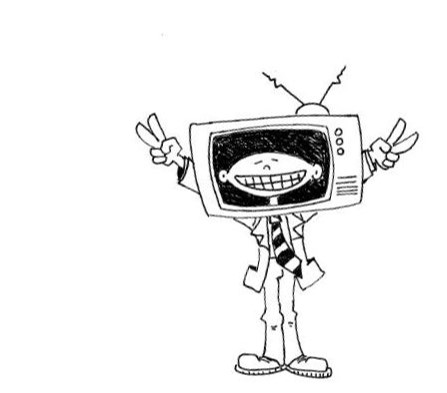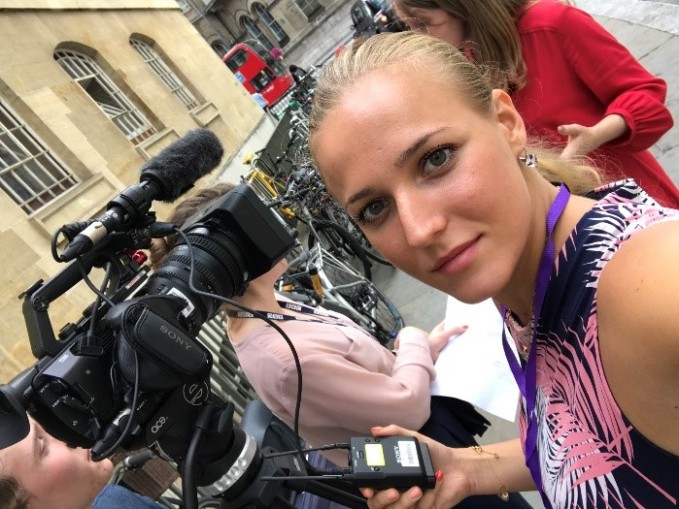 Petrana, BA Journalism and Communication, 3rd / final year at Middlesex University. Completed a two week work experience placement with BBC London, assisting with production of news for television and radio.
Petrana, BA Journalism and Communication, 3rd / final year at Middlesex University. Completed a two week work experience placement with BBC London, assisting with production of news for television and radio.
‘BBC London produces news programmes for television or radio, focusing on London stories, communities or politics. On my 2 week placement with BBC London, I spent 1 week working in radio, and 1 week in television.
‘I had the opportunity to pitch story ideas in front of all these famous correspondents and presenters.’
‘It felt like I was involved in everything; I assisted with the planning desk, research, pitching ideas for interesting stories. I was working really hard, waking up very early in the morning and going to sleep late each night. Every day we had an editorial meeting at 9.00am, all reporters, presenters and correspondents were there to discuss what’s been happening and what they need to cover that day.
‘Everything needed to be highly organised, as it all happens very fast; deciding what stories would be covered that day, then quickly tracking people down, going out and filming, bringing the package back, then immediately it would go out on the evening news programme.
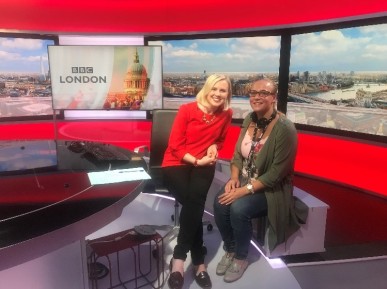 ‘It was a great experience and I’m glad to have done it.’
‘It was a great experience and I’m glad to have done it.’
‘During the morning meeting, I had the opportunity to pitch story ideas in front of all these famous correspondents and presenters. It was tough. In preparation I was doing lots of research at home, including reading newspapers every day.
‘Pitching ideas was very challenging and took a lot of confidence to stand up and speak, not knowing if they would like the story or not, thinking perhaps they’d already used the story! But I had very nice feedback about what to improve and what was good, so it was a great experience and I’m glad to have done it.
‘After the meeting I was very busy with research and calling people to see if they could make it on to the programme that day. It was really challenging as people don’t always respond. I had to find solutions to ensure the package was produced in time for the evening news. It’s a big responsibility and I needed to be really sure about what I was doing.
 ‘I gained more confidence in speaking out during meetings and pitching the right ideas and stories. This placement helped me develop my research skills and especially my journalism skills.’
‘I gained more confidence in speaking out during meetings and pitching the right ideas and stories. This placement helped me develop my research skills and especially my journalism skills.’
‘I found a story about a disabled man that had been in wheelchair most of his life, he got a new, special kind of wheelchair that could lift him up to a standing position, which enabled him to do things he couldn’t do before, like cooking. They liked the story, so I did the research and had to find his contact details, so I could call and do an interview. Usually it’s easy to get in touch with people using Facebook, but this man wasn’t on Facebook so it was quite challenging, however I managed to make contact by finding his daughter. I was able to interview the family and it got used on the Drive Time radio programme.
‘Every day felt special; It felt great walking to work in the morning as I was going somewhere I really wanted to be.’
‘I really enjoyed activities in radio, as I found it easier to speak up with ideas. It’s really tough to get story accepted for television, as there are a lot of experienced correspondents who all want to contribute, but the news is only 30 minutes long, so you can really feel the competition!
I also assisted on the BBC breakfast show, connecting calls to the live show, which was a big responsibility! I was really impressed by the production of the show and I learned a lot about how to be well-organised, work quickly, and check for any mistakes. I got to see how different areas of the BBC work, I gained more confidence in speaking out during meetings and pitching the right ideas and stories. This placement helped me develop my research skills and especially my journalism skills.
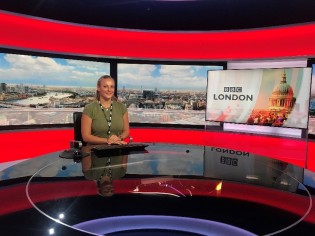 ‘I was always asking questions and looking for solutions, I was never quiet!’
‘I was always asking questions and looking for solutions, I was never quiet!’
‘On a placement you have the opportunity to meet people who inspire you; people that could perhaps help you in the future.’
Every day felt special; It felt great walking to work in the morning as I was going somewhere I really wanted to be, where the production quality was amazing and I could learn a lot from professionals. I worked really hard at university for the last 3 years, so going to work at BBC London felt like a reward! One editor told me “Petrana you will be a great journalist, because you never give up!” I was always asking questions and looking for solutions, I was never quiet!
‘You learn a lot on a placement, and it’s important to consider what you want to gain from it. Early on, I thought about what I wanted to achieve.’
‘Networking is very important for your career. On a placement you have the opportunity to meet people who inspire you; people that could perhaps help you in the future. Because of this placement, I now have amazing contacts and made good friends that are working for BBC London. They’ve helped by giving advice about my final project and they’ve sent me job opportunities through social media. It is very nice that they are thinking about me and see my potential as an aspiring young journalist. I am planning to approach these connections again after my Masters, to help me gain an internship or graduate job. Fingers crossed!
‘It was also important when applying for MA courses, universities have asked me if I have completed a placement. Luckily I had!’
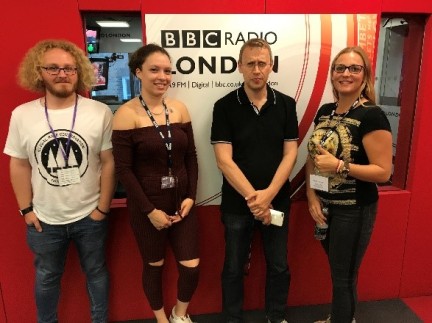 ‘You learn a lot on a placement, and it’s important to consider what you want to gain from it. Early on, I thought about what I wanted to achieve. It is extremely important for students to get out there and experience different types of roles, so they can find out if they like it, and find out if it’s what they really want to do with their life. In my first year I was trying to decide whether to do an internship in print or in television journalism. I tried working in television for 2 weeks and after that, I was certain that was what I wanted to do.
‘You learn a lot on a placement, and it’s important to consider what you want to gain from it. Early on, I thought about what I wanted to achieve. It is extremely important for students to get out there and experience different types of roles, so they can find out if they like it, and find out if it’s what they really want to do with their life. In my first year I was trying to decide whether to do an internship in print or in television journalism. I tried working in television for 2 weeks and after that, I was certain that was what I wanted to do.
‘My advice for other students is that you have to be active, outgoing, and hardworking.’
‘I’ve found that when going for an interview or applying online, they always ask if you have any similar experience. It was also important when applying for MA courses, universities asked me ‘if I have completed a placement. They asked if I have some experience in television journalism. Luckily I had! I knew that I wanted to continue with that subject and eventually work in journalism.
‘I applied for this placement by sending my CV and cover letter to the Programme Leader for Journalism & Media. Matt from MDXworks, looked at my CV before I applied and helped with the structure, as well as highlighted grammar issues, which was amazing. The MDXworks guides that Matt wrote on how to write your CV and cover letter, really inspired me too.
‘My advice for other students is that you have to be active, outgoing, and hardworking. Always when I was looking for a placement or doing work experience, I got feedback, and I tried to build on that feedback and always work hard.
‘Now that I’ve completed a placement, I’ve got more I can add to my CV, and I can provide links to my work in my applications to show what I have done.’
– Petrana, BA Journalism and Communication, 3rd / final year at Middlesex University. (Interview by Matt Lewis, MDXworks Careers & Employability Service)
MDX students can access our wide range of employability guides (including how to write a CV or cover letter, and finding placements or work experience) available from MDXworks.com or visit MDXworks Careers & Employability Service, room CG07, College Building.
Looking for a placement? Read ‘5 smarter ways to find a work placement’
Find out more about BBC work experience, placements and internships.
To receive email notifications of new posts, please use the ‘Follow’ button on the right.
